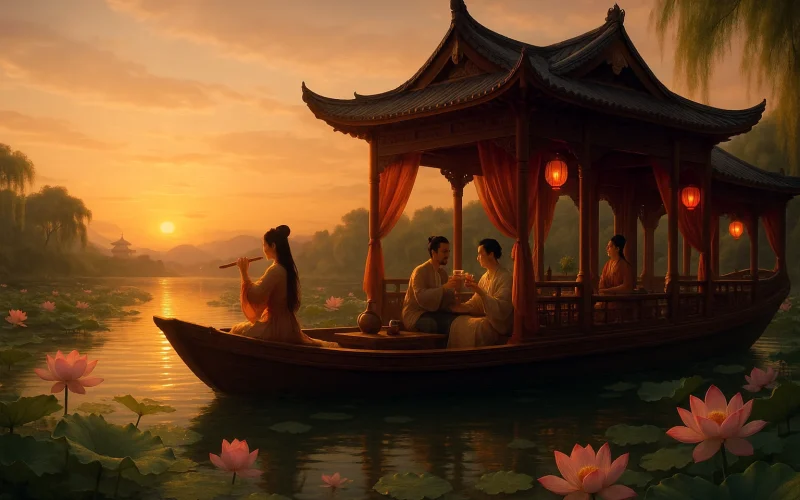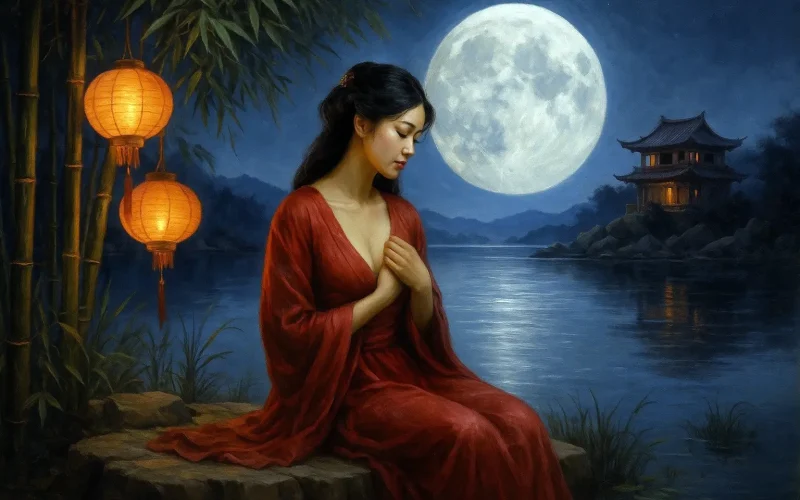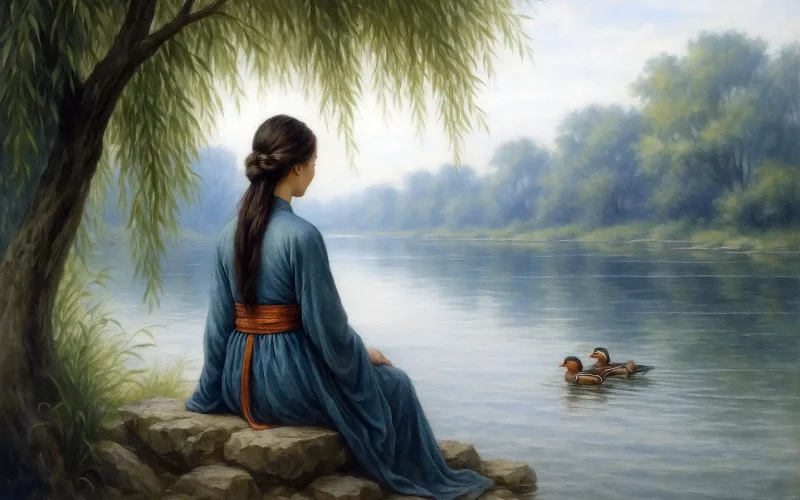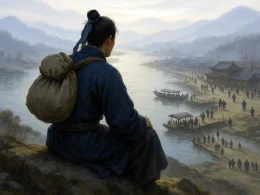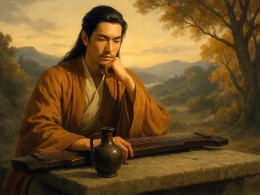After lotus blooms, how fine West Lake appears!
I come with wine in tow—
No banners needed here:
Red pavilions, green canopies escort me near.
The painted boat glides deep into the flowers’ heart,
Their fragrance spilling in golden cups we hold.
Through mist and drizzling rain,
A symphony of flutes guides us home—
Drunk on the scene itself.
Original Poem
「采桑子 · 荷花开后西湖好」
欧阳修
荷花开后西湖好,载酒来时。
不用旌旗,前后红幢绿盖随。
画船撑入花深处,香泛金卮。
烟雨微微,一片笙歌醉里归。
Interpretation
Composed during Emperor Renzong's Jiayou era (1056-1063), this lyric belongs to Ouyang Xiu's series of ten "Gathering Mulberries" (采桑子) poems written during his magistracy in Yingzhou (modern Fuyang, Anhui). Having resigned as Deputy Military Commissioner, the poet resided by West Lake, immersing himself in nature's beauty amidst scholarly company. This piece captures a lotus-viewing excursion with friends, reflecting his post-retirement spiritual liberation and profound communion with natural aesthetics.
First Stanza: "荷花开后西湖好,载酒来时。不用旌旗,前后红幢绿盖随。"
Hé huā kāi hòu xī hú hǎo, zài jiǔ lái shí. Bù yòng jīng qí, qián hòu hóng chuáng lǜ gài suí.
West Lake at lotus bloom—perfect for wine-loaded boats.
No banners needed:
Nature provides red canopies,
Green parasols afloat.
The opening declares seasonal perfection ("lotus bloom") as prerequisite for the excursion. The imperial metaphor ("red canopies/green parasols"—红幢绿盖) transforms lotus leaves and blossoms into a natural honor guard, subtly contrasting artificial pomp with organic grandeur. The absent "banners" (旌旗) quietly reject official pomp while celebrating nature's spontaneous ceremony.
Second Stanza: "画船撑入花深处,香泛金卮。烟雨微微,一片笙歌醉里归。"
Huà chuán chēng rù huā shēn chù, xiāng fàn jīn zhī. Yān yǔ wēi wēi, yī piàn shēng gē zuì lǐ guī.
Painted barge pushes through floral maze—
Fragrance permeates golden cups.
Misty drizzle blurs
Our drunken return amid flute's
Lingering hiccups.
The sensory journey crescendos: visual ("painted barge"), olfactory ("fragrance permeates"), and gustatory ("golden cups") pleasures merge in the lotus thicket. The "misty drizzle" (烟雨) and lingering flute songs (笙歌) dissolve spatial boundaries, creating an impressionistic return where intoxication blends with nature's own rhythms—a synesthetic masterpiece of late-Song aestheticism.
Holistic Appreciation
This lyric poem captures the joy of boating amidst summer lotuses on West Lake, embodying the poet’s transcendent retreat into nature’s embrace. The opening line, "After lotus blooms, West Lake is at its best," declares both seasonal beauty and inner contentment. The imagery of "red canopies, green parasols" whimsically likens lotus leaves and flowers to an honor guard, infusing nature with regal vitality while humorously reflecting the poet’s own leisurely detachment.
The middle section—"a painted boat glides deep into the flowers, / their fragrance spilling over golden cups"—intertwines sight and scent, where lotus perfume blends with wine, creating an intoxicating ethereality. The closing lines, "misty rain, a drizzle— / amid flutes and songs, drunk, we return," cloak the scene in hazy enchantment. Faint music merges with the landscape, dissolving boundaries between human and nature, sound and color, culminating in a vision of perfect harmony.
More than a mere depiction of a lotus-viewing excursion, this poem symbolizes the poetry of reclusive life. Freed from political strife, the poet’s heart finds solace in nature, embracing the true delight of "drunk, we return." The verses balance Song lyricism’s delicate grace with unconstrained ease, vividly conveying Ouyang Xiu’s spiritual state and aesthetic leanings during his retirement in Yingzhou.
Artistic Merits
- Metaphorical Brilliance, Blending Real and Imagined: The lotus leaves and blooms, likened to a "red and green honor guard," elevate nature into lyrical splendor.
- Multisensory Harmony: Sight ("painted boat"), smell ("fragrance"), and sound ("flutes and songs") interweave, crafting an immersive experience—floating through a painting, drinking in fragrance, returning in music.
- Scene and Sentiment Fused, Emotion Sublime: The poet’s joy on the lake mirrors inner liberation, embedding feeling within scenery and celebrating life’s pleasures through nature’s beauty.
- Elegant Language, Serene Style: The diction is fresh and effortless, the tone unhurried and gentle, reflecting the poet’s late-life tranquility and freedom.
Insights
This poem is more than a lyrical sketch of summer boating—it is a spiritual portrait of finding solace and freedom in nature. It reminds us that amid life’s chaos, pausing to immerse ourselves in natural beauty can offer profound comfort and liberation. As Ouyang Xiu discovered on West Lake: life needs no pomp or ceremony, no grand displays. Simply harmonizing with nature’s rhythms is enough to stir the soul and dissolve worldly cares.
About the Poet
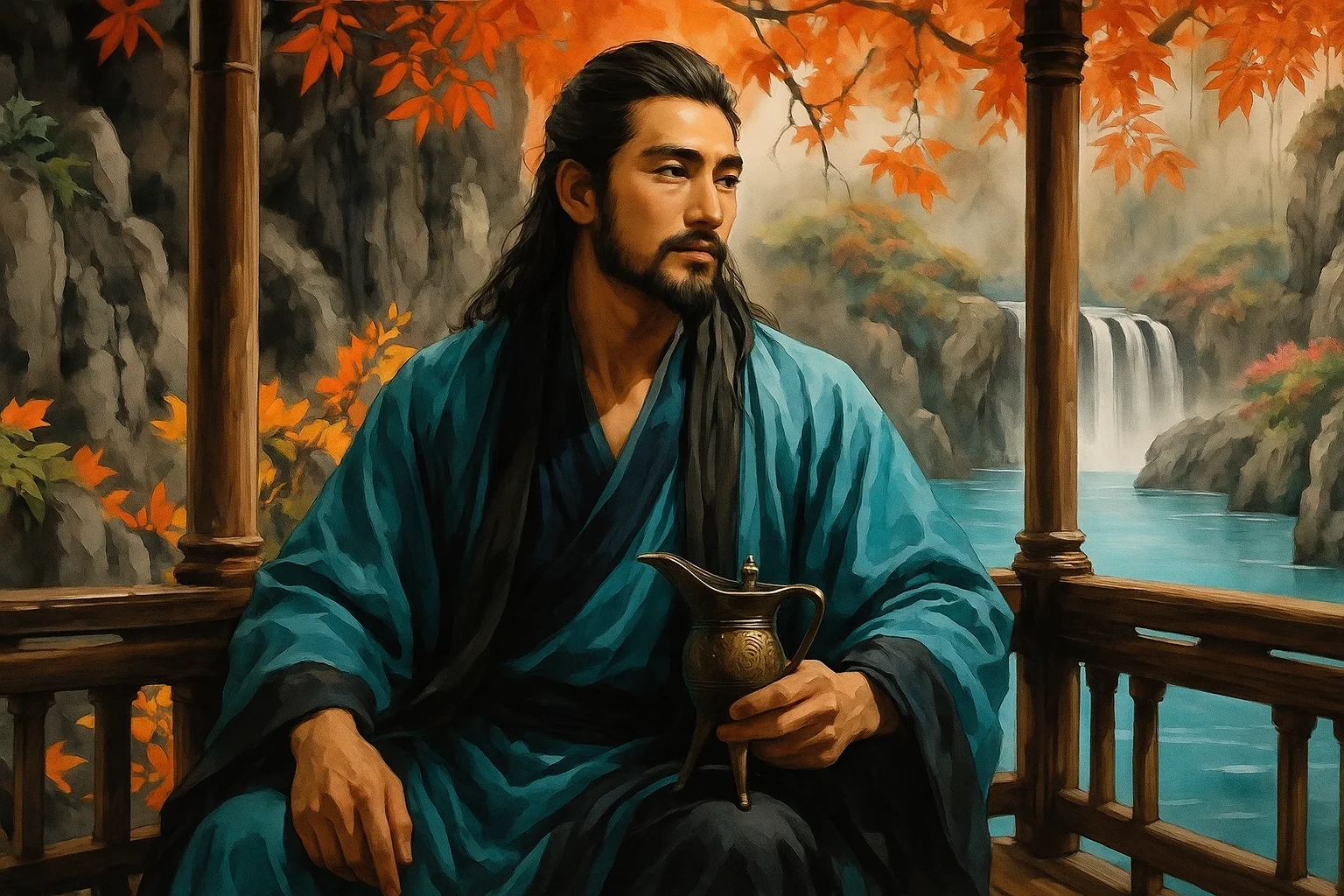
Ouyang Xiu (欧阳修, 1007 - 1072), a native of Yongfeng, Jizhou (present-day Jiangxi Province), emerged as the preeminent literary figure of the Northern Song Dynasty. After attaining the jinshi degree in 1030, he spearheaded a literary reform movement that rejected the ornate Xikun style prevalent at court. As a mentor who nurtured literary giants like Su Shi and Zeng Gong, he laid the foundation for the golden age of Northern Song literature. Recognized as one of the "Eight Great Prose Masters of Tang and Song," Ouyang stands as the pivotal figure in the transformation of Northern Song literary culture.






